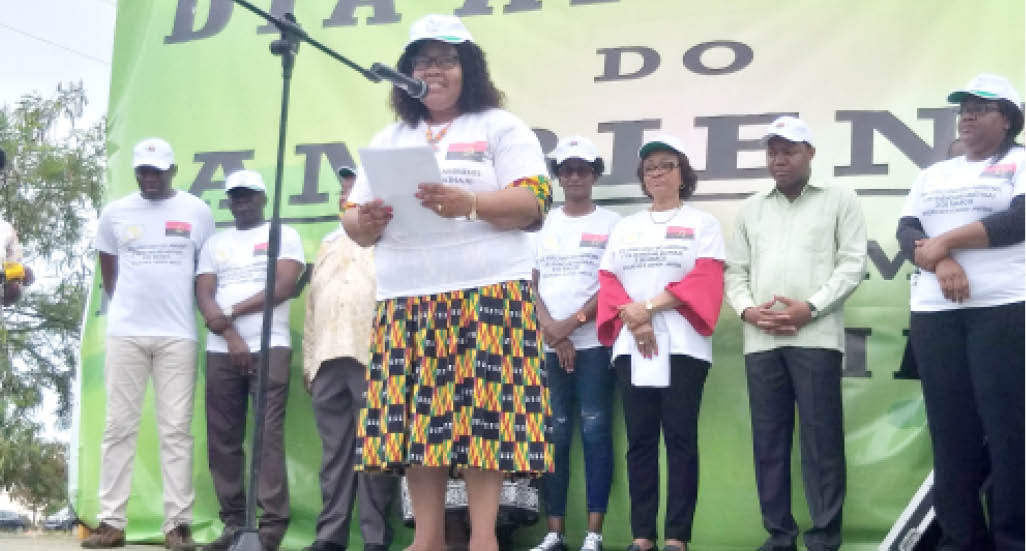The Africa continent is home to abundant natural resources, serving as means of livelihood to many especially in the rural communities.
However, over dependency on the natural resources has led to serious environmental challenges such as desertification, pollution, erosion, drought, loss of biodiversity and fauna depletion among others.
These challenges have placed Africa at a disadvantage as many of the natural resources are being depleted at what experts, and other stake holders consider a very fast pace.
However, given the closeness to nature and the provider role for the family, women are also among the most vulnerable groups to the impacts from droughts and degradation of the natural resource base.
Also, women are challenged by access to secure land tenure, financial resources and capacity building assistance.
Recently, the African Environment Day marked with three days long activities alongside the Wangari Mathaai Day in Luanda, Angola emphasised the need for governments to raise policies that will enhance women participation in addressing environmental challenges.
Speaking at the event, the African Union Commission’s Commissioner for Rural Economy and Agriculture, Ambassador Josefa Leonel Correia, said the aim of the forum was to raise political awareness on strengthening regional and national policies and strategies that would enhance women access to land and other natural resources.
“Women are at the centre of sustainable development as enshrined in the Africa Agenda 2063 and Sustainable Development Goals,” she said, adding that “They are entitled to a peaceful, healthy and productive life in harmony with nature.”
While noting that women have an indispensable role in promoting sustainable natural resource management, she said they are unfortunately inadequately represented at all levels of policy formulation and decision-making in natural resource and environmental management, conservation, protection and rehabilitation.
The theme of the event, ‘Women, Environment and Peace’, emphasises the important role women play in ensuring environmental stability and peace. It also reflects the truth that environmental degradation and lack of peace negatively affect the development prospects for women.
Ambassador Correia explained that there are many glaring examples in Africa of the serious impacts of natural resources degradation and subsequent conflicts and instability it leads to.
“Competition for natural resources; land, water and pasture are some of the underlining causes of conflicts in many areas of Africa. Women bear the brunt of these conflicts and environmental degradation,” she said.
The Namibian Deputy Minister of Environment and Tourism, Bernadette Maria Jagger, said the role of women in the African context has for a long time been closely tied to nature.
She said: “History has dictated that it has typically been men who have gone out into the world leaving women behind to care for the land and loved ones. Thus traditional gender roles have brought women to depend directly on the natural resource base to sustain both themselves and their families.”
“It is women that are the main day-to-day managers of agricultural and biological resources. It is women that are responsible for tilling the land, collecting firewood and fetching water,” Maria Jagger said.
The deputy minister maintained that the roles make women key sources of indigenous knowledge and the on-the-ground “agents of change” for new approaches to the management of land, water, forests and wildlife.
However, the forum maintained that women can preserve the environment by utilising the available resources in the environment to empower themselves.
The Senior Policy Officer for Forestry and Land Sustainable Management, AU, Almami Dampha, said the celebrations are meant to generate a change of attitude through which people would value and protect their environment and natural resources.
He said there is need to provide space for women and girls to exploit and cultivate various skills using the natural resources available in their environments to create environmentally friendly products and services.
Sudan’s National Coordinator of Gum Arabic Producers Associations (GAPAs), Fatima M.A. Ramly, in her presentation tagged ‘Role of Women in Sustainable Gum Production and Marketing through Producer’s Associations’, said gum Arabic, which is mostly produced by women, is the main source of income of more than 5 million people in rural area of Sudan.
She noted that the production of gum Arabic helps to fight desertification and drought.
According to her, women can preserve the environment while harnessing and managing the natural resources within their immediate environment and at the same time improve their welfare.
She said the role of women is very significant in the entire gum cycle, and thus need to encourage the establishment of gum Arabic associations in other countries to build their capacities, improve their skills and enable them to take part in setting policies and decisions related to pricing, storage, processing and export of gum Arabic.
A deputy director at the Lagos State Environmental Protection Agency (LASEPA), Fatokun Adedayo Olubukola, said women are known as managers and have a great role to play in the environment.
She said women usually give waste management a higher priority than men, but their participation in community decision-making is minimal.
She said they can help to manage waste in a sustainable way by creating awareness and providing education to the family and communities on how to do it sustainably.
Subsequently, the forum recommended that a continent-wide association of women environmentalists should be created to advocate for sustainable natural resource management.
“We call on African governments to formulate and implement appropriate policies that support women access and control of natural resources. Support women to increase their economic opportunities in alternative livelihood activities and small to large scale enterprises which are environment friendly,” she urged.
While urging African governments to avoid converting mangrove ecosystems to human settlements and other unsustainable uses, the forum called for strengthening of laws governing the management of mangroves at all levels.
It also seeks the mobilization of financing schemes for women and youth projects and programmes to address climate change.

 Join Daily Trust WhatsApp Community For Quick Access To News and Happenings Around You.
Join Daily Trust WhatsApp Community For Quick Access To News and Happenings Around You.


